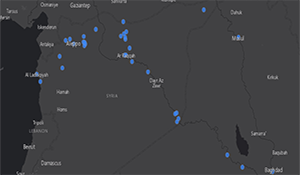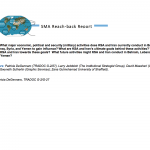Iran and Saudi Arabia Influence

Question (R2 QL 11): What major economic, political and security (military) activities does KSA and Iran currently conduct in Bahrain, Lebanon, Iraq, Syria, and Yemen to gain influence? What are KSA and Iran’s ultimate goals behind these activities? What motivates KSA and Iran towards these goals? What future activities might KSA and Iran conduct in Bahrain, Lebanon, Iraq, Syria, and Yemen?
Author | Editor: DeGennaro, P. (TRADOC G-2/G-27).
The geopolitical landscape in this region is vast and complex. History, lands, family, culture and economic resources are closely intertwined. The Kingdom of Saudi Arabia (KSA) and Iran in particular are opposing influencers in these neighboring countries and populations. KSA sees itself as the Sunni protector and the legitimate rulers of the Arabian Peninsula while Iran takes the position of Shite protector. Religion is often used to veil outright economic and military operations by both countries quite often through group proxies. Both Iran and KSA have vast oil and gas resources with extreme and autocratic rulers that work tirelessly to shape, influence and dominate the region thereby ensuring primacy, longevity and wealth.
There are distinct differences between the nations. Iran’ has a rich history from the time of the Persian Empire while the Saud family came from a waring tribe in the desert cleverly undermining Western colonizers who aligned with its rival ruling family. Both countries have a population with high literacy, but minimal freedoms, Iran’s being a more progressive population with a larger middle class.
To date, each government continues to try project influence internationally, regionally, and locally through statecraft and, sometimes lethally, through proxy actors within and between states. Below are SMA contributions that identify ways in which KSA and Iran influence Yemen, Bahrain, Lebanon, Iraq and Syria in the cognitive, economic, political and security realms. Each has a dedicated narrative giving reason to justify influence although, it is important to note that the receiving countries and non-state actors are not so easily manipulated. Although they may not have similar political powers, they are by no means without their own abilities and interests.
Contributing Authors
Jeddeloh, L. (The Institutional Strategist Group), Mazaheri, D. (IL Intellaine), Sutherlin, G. (Geographic Services Inc.), Gulmohamad, Z. (University of Sheffield)

Comments